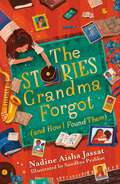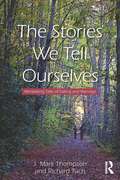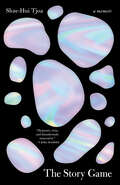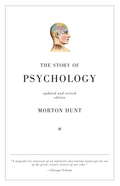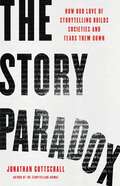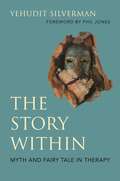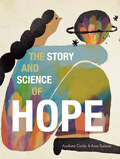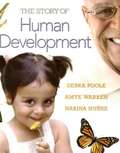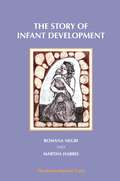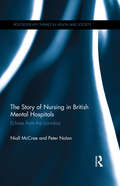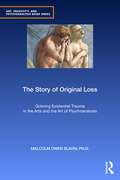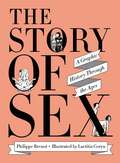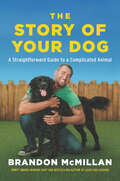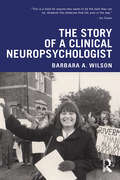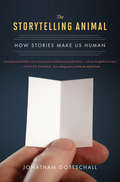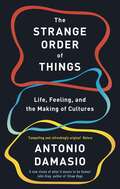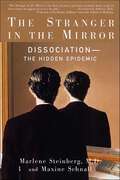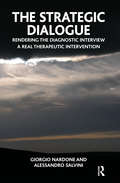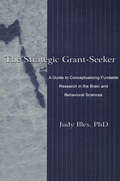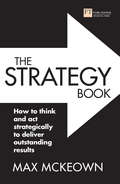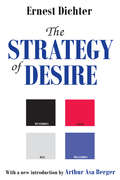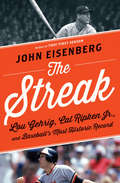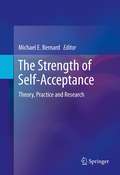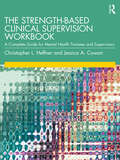- Table View
- List View
The Stories Grandma Forgot (and How I Found Them)
by Nadine Aisha Jassat'One of those books that truly makes the world a better place.' Sophie Anderson, author of the House with Chicken LegsFrom acclaimed poet Nadine Aisha Jassat comes a gripping mystery... "Grandma Farida is losing her memory - but I'm going to help her remember a huge secret."Twelve-year-old Nyla's dad died when she was four, or that's what she's been told. So when Grandma Farida insists she saw him in the supermarket, Nyla wonders if she is 'time-travelling' again - the phrase she uses when Grandma forgets. But when Grandma asks Nyla to find her dad and bring him home, Nyla promises that she will. As Nyla sets out on her journey, she hopes that uncovering the past will help her to understand the mystery at the heart of her family ... and to work out who she is. A page-turning verse novel about memory and identity, and a bond that soars above all else.'A beautiful read about love, family, identity and worth.' Hannah Gold, author of The Last Bear'A tender story about the meaning of life and love and loss.' Katya Balen, author of October, October
The Stories We Are
by William RandallFrom time to time we all tend to wonder what sort of "story" our life might comprise: what it means, where it is going, and whether it hangs together as a whole. In The Stories We Are, William Lowell Randall explores the links between literature and life and speculates on the range of storytelling styles through which people compose their lives. In doing so, he draws on a variety of fields, including psychology, psychotherapy, theology, philosophy, feminist theory, and literary theory.Using categories like plot, character, point of view, and style, Randall plays with the possibility that we each make sense of the events of our lives to the extent that we weave them into our own unfolding novel, as simultaneously its author, narrator, main character, and reader. In the process, he offers us a unique perspective on features of our day-to-day world such as secrecy, self-deception, gossip, prejudice, intimacy, maturity, and the proverbial "art of living."First published in 1995, this second edition of The Stories We Are includes a new preface and afterword by the author that offer insight into his argument and evolution as a scholar, as well as an illuminating foreword by Ruthellen Josselson.
The Stories We Tell Ourselves: Mentalizing Tales of Dating and Marriage
by Richard Tuch J. Mark ThompsonThe Stories We Tell Ourselves: Mentalizing Tales of Dating and Marriage is about the dynamics of intimate interpersonal relationships (dating and marriage) - how and why human pairings occur, what helps them function optimally and how therapists can intervene when they don't. J. Mark Thompson and Richard Tuch employ a multidimensional perspective that provides a variety of "lenses" through which intimate relationships can be viewed. The authors also offer a new model of couples therapy based on the mentalization model of treatment developed by Peter Fonagy and his colleagues. This book is aimed at those interested in the nature of intimate relationships as well as those wishing to expand their clinical skills, whether they are conducting one-on-one therapy with individuals struggling to establish and maintain intimate relations or are conducting conjoint treatment with troubled couples who have sought the therapist's assistance. Thompson and Tuch view relationships from a wide array of different perspectives: mentalization, attachment theory, evolutionary psychology, psychoanalysis, pattern recognition (neuroscience), and role theory. A mentalization based approach to couples therapy is clearly explained in a "how to" fashion, with concrete suggestions about how the therapist goes about clinically intervening given their expanded understanding of the dynamics of intimate relations outlined in the book. The Stories We Tell Ourselves: Mentalizing Tales of Dating and Marriage will appeal to psychoanalysts, psychotherapists, psychiatrists, psychologists, clinical social workers, marriage therapists, and all those interested in both learning more about the dynamics of one-on-one intimate relationships (dating and marriage) from a truly multidimensional perspective and in learning how to conduct mentalization-based couples therapy.
The Story Game
by Shze-Hui TjoaAs Seen in The New York Times Book Review “Hypnotic, wise, and thunderously innovative.”— T Kira Madden “A powerful work of art and healing.”—Jaquira Díaz In the humid dark of a eucalyptus-scented room, a woman named Hui lies on a mattress telling stories about herself to her listener, a little girl. She talks about her identity as the child of an immigrant, her feelings about being in a mixed-race marriage, her opinions on mental health. But as her stories progress, it becomes clear a volatile secret lurks beneath their surface. There are events in Hui’s past that have great significance for the person she’s become, but that have gone missing from her memory. What is it, exactly, that is haunting Hui? Who is the little girl she talks to? And who is Hui herself? As the conversation continues, what unfolds is a breathtaking, unexpected journey through layers of story toward truth and recovered identity; a memoir that reenacts, in tautly novelistic fashion, the process of healing that author Shze-Hui Tjoa moved through to recover memories lost to complex PTSD and, eventually, reconstruct her sense of self. Stunning in its originality and intimacy, The Story Game is a piercing tribute to selfhood and sisterhood, a genre-shattering testament to the power of imagination, and a one-of-a-kind work of art.
The Story Of Psychology
by Morton HuntSocrates, Plato, Descartes, Spinoza, Mesmer, William James, Pavlov, Freud, Piaget, Erikson, and Skinner. Each of these thinkers recognized that human beings could examine, comprehend, and eventually guide or influence their own thought processes, emotions, and resulting behavior. The lives and accomplishments of these pillars of psychology, expertly assembled by Morton Hunt, are set against the times in which the subjects lived. Hunt skillfully presents dramatic and lucid accounts of the techniques and validity of centuries of psychological research, and of the methods and effectiveness of major forms of psychotherapy. Fully revised, and incorporating the dramatic developments of the last fifteen years, The Story of Psychology is a graceful and absorbing chronicle of one of the great human inquiries--the search for the true causes of our behavior.
The Story Paradox: How Our Love of Storytelling Builds Societies and Tears them Down
by Jonathan GottschallStorytelling, a tradition that built human civilization, may soon destroy itHumans are storytelling animals. Stories are what make our societies possible. Countless books celebrate their virtues. But Jonathan Gottschall, an expert on the science of stories, argues that there is a dark side to storytelling we can no longer ignore. Storytelling, the very tradition that built human civilization, may be the thing that destroys it.In The Story Paradox, Gottschall explores how a broad consortium of psychologists, communications specialists, neuroscientists, and literary quants are using the scientific method to study how stories affect our brains. The results challenge the idea that storytelling is an obvious force for good in human life. Yes, storytelling can bind groups together, but it is also the main force dragging people apart. And it&’s the best method we&’ve ever devised for manipulating each other by circumventing rational thought. Behind all civilization&’s greatest ills—environmental destruction, runaway demagogues, warfare—you will always find the same master factor: a mind-disordering story.Gottschall argues that societies succeed or fail depending on how they manage these tensions. And it has only become harder, as new technologies that amplify the effects of disinformation campaigns, conspiracy theories, and fake news make separating fact from fiction nearly impossible.With clarity and conviction, Gottschall reveals why our biggest asset has become our greatest threat, and what, if anything, can be done. It is a call to stop asking, &“How we can change the world through stories?&” and start asking, &“How can we save the world from stories?&”
The Story Within - Myth and Fairy Tale in Therapy
by Yehudit SilvermanSomewhere hidden in the depths of each story lies a treasure waiting to be discovered...This creative arts therapies approach uses myth and fairy tale to explore personal challenges. Clients begin by choosing a myth or fairy tale character they feel drawn to, but don't know why. They and their chosen character then embark on a guided creative journey that leads them to discover hidden, unconscious, aspects of themselves. The process is holistic, using all the arts. In addition to explaining the theoretical background of this approach, the book provides detailed step-by-step instructions for readers to follow for their own personal exploration, including specific creative exercises at each stage, and guidelines for using the approach with clients. Also included are clinical case vignettes, reflections from people who have experienced the process, and the authors own personal journey.Whether you are a creative arts therapist seeking to expand your practice, or a health professional searching for a new, creative way of working with clients, The Story Within is an exciting new resource.
The Story and Science of Hope
by Andrea CurtisHope is more than a feeling — it can change the world! Discover how new science and ancient knowledge can help us face an uncertain world. All over the world, kids are struggling with grief, anxiety and fear about the climate crisis, war, and a future that seems out of their control. Sometimes it’s hard to have hope – but hope may be the one thing that can change the world! Modern researchers – called Hope Theorists – are helping us to understand that we can use hope to improve our own lives and those of our neighbors, friends and even the planet. The Story and Science of Hope is an illustrated nonfiction book for middle-grade readers that weaves together ancient history with surprising new scientific research showing hope is more than a feeling — it’s essential for our well-being. People who are high in hope are happier and healthier, they live longer, do better in school and have stronger friendships. Learn the history of hope, how it can be measured, learned and practiced — even where you can find hope in your brain (spoiler: it’s the bilateral medial orbitofrontal cortex, above your eyes and a few centimetres inside your brain)! Backmatter includes real-world examples of hopeful environmental activists and a list of ways that kids can cultivate hope, as well as a glossary of unfamiliar terms, sources and further reading. Key Text Features illustrations definitions facts further information further reading glossary headings historical context Correlates to the Common Core State Standards in English Language Arts: CCSS.ELA-LITERACY.RI.4.2 Determine the main idea of a text and explain how it is supported by key details; summarize the text. CCSS.ELA-LITERACY.RI.4.8 Explain how an author uses reasons and evidence to support particular points in a text. CCSS.ELA-LITERACY.RI.5.2 Determine two or more main ideas of a text and explain how they are supported by key details; summarize the text. CCSS.ELA-LITERACY.RI.5.8 Explain how an author uses reasons and evidence to support particular points in a text, identifying which reasons and evidence support which point(s). CCSS.ELA-LITERACY.RI.6.2 Determine a central idea of a text and how it is conveyed through particular details; provide a summary of the text distinct from personal opinions or judgments. CCSS.ELA-LITERACY.RI.6.3 Analyze in detail how a key individual, event, or idea is introduced, illustrated, and elaborated in a text (e.g., through examples or anecdotes). CCSS.ELA-LITERACY.RI.6.5 Analyze how a particular sentence, paragraph, chapter, or section fits into the overall structure of a text and contributes to the development of the ideas. CCSS.ELA-LITERACY.RI.6.6 Determine an author's point of view or purpose in a text and explain how it is conveyed in the text.
The Story of Human Development (1st edition)
by Debra A. Poole Narina Nunez Amye WarrenThe book presents fascinating details and descriptions of human development throughout the lifespan with a narrative infused with the rich and diverse stories of people's lives, the compelling organization, a unique connecting summaries and focus on guiding developmental principles. This text puts the science of human development into a framework that better explains and explores how a whole person develops within varying environmental contexts.
The Story of Infant Development
by Martha Harris Romana NegriThis book brings together the closely observed development of Simone (from birth to three) and the perceptive comments of Martha (or Mattie) Harris, who was such an influential figure in the development of the Observational Studies Course at the Tavistock. Romana Negri's pioneering work on neonatal intensive care units is informed both by infant observation and by psychoanalysis. She presents in this volume the transcribed tapes of her detailed observation of a normally developing infant, whom Martha Harris supervised for three years. Other chapters present observations of children in hospital that formed part of their diagnostic assessment, and the book includes commentaries by Donald Meltzer and Martha Harris together. This book will be of outstanding interest to all readers whether parents, teachers, or mental health professionals who wish to deepen their understanding of the roots of mental life.
The Story of Nursing in British Mental Hospitals: Echoes from the Corridors (Routledge Key Themes in Health and Society)
by Peter Nolan Niall McCraeFrom their beginnings as the asylum attendants of the 19th century, mental health nurses have come a long way. This comprehensive volume is the first book in over twenty years to explore the history of mental health nursing, and during this period the landscape has transformed as the large institutions have been replaced by services in the community. McCrae and Nolan examine how the role of mental health nursing has evolved in a social and professional context, brought to life by an abundance of anecdotal accounts. Moving from the early nineteenth to the end of the twentieth century, the book’s nine chronologically-ordered chapters follow the development from untrained attendants in the pauper lunatic asylums to the professionally-qualified nurses of the twentieth century, and, finally, consider the rundown and closure of the mental hospitals from nurses’ perspectives. Throughout, the argument is made that whilst the training, organisation and environment of mental health nursing has changed, the aim has remained essentially the same: to develop a therapeutic relationship with people in distress. McCrae and Nolan look forward as well as back, and highlight significant messages for the future of mental health care. For mental health nursing to be meaningfully directed, we must first understand the place from which this field has developed. This scholarly but accessible book is aimed at anyone with an interest in mental health or social history, and will also act as a useful resource for policy-makers, managers and mental health workers.
The Story of Original Loss: Grieving Existential Trauma in the Arts and the Art of Psychoanalysis (Art, Creativity, and Psychoanalysis Book Series)
by Malcolm Owen Slavin, PhDThis book explores the universal human existential trauma of "original loss," a trauma the author describes as arising from our primal, human evolutionary loss of experiencing ourselves as innately belonging to, and instinctively at home within, the larger natural world.In this trauma arose our existential awareness of impermanence and mortality along with the need to mourn that loss in order to create a sense of belonging and identity. The book describes how the invention of art and group ritual became the collective ways we mourn our shared existential loss. It describes as well how it is the art within the psychoanalytic practice that enables both patient and analyst to grieve their individual versions of our shared original loss. Drawing on the work of Winnicott, Loewald and Ogden, as well as art theory and religion, this book offers a new perspective on the intersection of metaphorical artistic thinking and psychoanalysis.This book will appeal to psychoanalysts, psychotherapists, and scholars of poetic, visual and muscial metaphor, creativity, evolution and history of art.
The Story of Sex: A Graphic History Through the Ages
by Philippe Brenot Laetitia Coryn Will McmorranThe first graphic history of sex chronicles sexuality and human intimacy through the ages, from our primate pasts to our robotic futures.Humans have had sex on the brain since pre-civilization either for pleasure, power, revenge, a desire for children, or simply because it isn't allowed. Today, sex is all around us but it's rarely explained and almost never taught. In The Story of Sex, sexologist Phillipe Brenot combines anthropology, sociology, psychology and history with witty comics by Latetita Coryn for an in-depth explanation of this essential aspect of humanity. Organized chronologically into sections like Babylon: Free Love, The Middle Ages: Heaven and Hell, and The 20th Century: Sexual Liberation, Brenot explores what eroticism really is, how our ancestors behaved sexually, when the first couple was established, how superstition and morality laws shaped sexuality, the use of pornography in the digital age, and how some ancient civilizations were far ahead of their time when it came to gender equality.Full of fascinating details like Cleopatra's invention of the vibrator and a Dutch shopkeeper's accidental discovery of the existence of sperm--all accompanied by hilarious comics and dialogue--The Story of Sex is informative, unique, and entertaining book.
The Story of Your Dog: A Straightforward Guide to a Complicated Animal
by Brandon McMillanGET TO KNOW YOUR DOG. Renowned expert dog trainer and bestselling author of Lucky Dog Lessons Brandon McMillan unpacks the unique and often misunderstood 15,000-year evolutionary history governing a dog’s every move.Most dog owners know the truth—their dogs are totally incompatible with the modern world. Instincts like herding, chasing, and protecting have no natural outlet and frequently result in chewing, barking, nipping, jumping, lunging, and worse. However, as McMillan argues in these pages, the solution isn’t as simple as mastering “sit” and “stay.” No matter what kind of dog you have, no matter how old or young or well trained or well-bred, your beloved companion is strongly influenced by his DNA. The result of these genetic distinctions shows up in every inch and action—from the size and shape of a dog’s head (and the brain inside it) to the length and curve of his tail, from the texture of her fur to the webbing (or lack of webbing) between her toes. It’s in their lung capacity, their tolerance for heat and cold, their appetites for food and exercise, and whether and how they bark. It goes beyond their structure and deep into their psychological profiles. Perhaps you’re lucky enough to have a dog with more than a few breeds mixed in, which makes this information all the more crucial to know and understand. In The Story of Your Dog, McMillan breaks down why your dog acts the way it does, so you can train better and easier, with fewer missteps and miscommunications, and bond in ways you never thought possible. It is an invitation to get to know the sometimes frustrating but always incredible dog at the other end of the leash.
The Story of a Clinical Neuropsychologist
by Barbara A. WilsonFrom a disadvantaged childhood to becoming one of our best-loved clinical neuropsychologists, this exceptional book tells the life story of Barbara A. Wilson, who has changed the way we think about brain injury rehabilitation. Barbara’s story shows how it is possible to have a fulfilling career alongside a successful family life, even when faced with the deepest of personal tragedies; the death of her adult daughter Sarah. Clinical and neuropsychologists will recognise Barbara’s influence on rehabilitation practice and her tireless aim to get what is best for people needing neuropsychological rehabilitation. It will inspire those with brain injury and their families who may struggle to make life meaningful, as well as encourage readers to stick to their beliefs and triumph in the face of obstacles.
The Storytelling Animal: How Stories Make Us Human
by Jonathan Gottschall&“Insightful...draws from disparate corners of history and science to celebrate our compulsion to storify everything around us.&”—The New York Times Book Review Humans live in landscapes of make-believe. We spin fantasies. We devour novels, films, and plays. Even sporting events and criminal trials unfold as narratives. Yet the world of story has remained an undiscovered and unmapped country. It&’s easy to say that humans are &“wired&” for story, but why? In this delightful, original book, Jonathan Gottschall offers the first unified theory of storytelling. He argues that stories help us navigate life&’s complex social problems—just as flight simulators prepare pilots for difficult situations. Storytelling has evolved, like other behaviors, to ensure our survival. Drawing on the latest research in neuroscience, psychology, and evolutionary biology, Gottschall tells us what it means to be a storytelling animal. Did you know that the more absorbed you are in a story, the more it changes your behavior? That all children act out the same kinds of stories, whether they grow up in a slum or a suburb? That people who read more fiction are more empathetic? Of course, our story instinct has a darker side. It makes us vulnerable to conspiracy theories, advertisements, and narratives about ourselves that are more &“truthy&” than true. National myths can also be terribly dangerous: Hitler&’s ambitions were partly fueled by a story. But as Gottschall shows, stories can also powerfully change the world for the better. We know we are master shapers of story. The Storytelling Animal finally reveals how stories shape us. &“Lively.&”—San Francisco Chronicle &“Absorbing.&”—Minneapolis Star Tribune &“One of my favorite evolutionary psych writers—always insightful and witty.&”—Steven Pinker
The Strange Order Of Things: Life, Feeling and the Making of Cultures
by Antonio Damasio'Damasio undertakes nothing less than a reconstruction of the natural history of the universe ... [A] brave and honest book' The New York Times Book ReviewThe Strange Order of Things is a pathbreaking investigation into homeostasis, the condition of that regulates human physiology within the range that makes possible not only survival but also the flourishing of life. Antonio Damasio makes clear that we descend biologically, psychologically and even socially from a long lineage that begins with single living cells; that our minds and cultures are linked by an invisible thread to the ways and means of ancient unicellular existence and other primitive life-forms; and that inherent in our very chemistry is a powerful force, a striving toward life maintenance that governs life in all its guises, including the development of genes that help regulate and transmit life.The Strange Order of Things is a landmark reflection that spans the biological and social sciences, offering a new way of understanding the origins of life, feeling and culture.
The Stranger in the Mirror: Dissociation—The Hidden Epidemic
by Maxine Schnall Marlene SteinbergDiscover groundbreaking findings on a hidden epidemic -- and why it so often is misdiagnosed.You peer into the mirror and have trouble recognizing yourself. You feel as if you're going through the motions of life or you're watching a movie of yourself.These are all symptoms of dissociation -- a debilitating psychological condition involving feelings of disconnection that affects 30 million people in North America and often goes untreated. The Stranger in the Mirror offers unique guidelines for identifying and recovering from dissociative symptoms based on Dr. Marlene Steinberg's breakthrough diagnostic test. Filled with fascinating case histories of people with multiple personalities, this book provides enlightening insights into how all of us respond to trauma and overcome it. Her innovative method of treatment will benefit anyone in search of a healthier sense of self and a heightened capacity for joy.
The Strategic Dialogue: Rendering the Diagnostic Interview a Real Therapeutic Intervention
by Giorgio Nardone Alessandro SalviniThe Strategic Dialogue is a fine strategy by which one can achieve maximum results with minimum effort. It was developed through a natural evolutionary process from previous treatments for particular pathologies, and composed of therapeutic stratagems and specific sequences of ad hoc maneuvres constructed for different types of problems. This book represents both the starting and finishing line of all of the research, clinical practice, and managerial consulting performed by the authors over a fifteen year period at the Centro Terapia Strategica of Arezzo (Strategic Therapy Center). This work can be referred to as the finishing line because the Strategic Dialogue, an advanced therapeutic method of conducting a therapy session and inducing radical changes rapidly in the patient, represents the culmination of all that has been achieved so far in the field.
The Strategic Grant-seeker: A Guide To Conceptualizing Fundable Research in the Brain and Behavioral Sciences
by Judy IllesAn understanding of each of the critical components of the funding process is key to meeting the challenges posed by the increasingly intense competition for research funds. This book is a vital tool for those who want to build and maximize their grant support. Although many publications provide valuable information about proposal preparation, few cover the full spectrum of issues--from planning through execution--in the funding process. The book leads off with a discussion of the relationship between researchers and the funding environment, features of good short- and long-range funding plans, characteristics of funding organizations in terms of funding power, mission, and priorities, and the manner in which funding information is disseminated. Succeeding chapters focus on the actual development of the many different types of opportunities--research projects, multicomponent research programs, career development and training programs, and small business innovation research. These chapters emphasize conceptualizing an idea, optimizing the researcher-sponsor match, and testing the concept for competitiveness. Further chapters deliver strategies for translating research ideas into written proposals, preparing administrative sections and communicating with a sponsor. The final chapters are dedicated to the outcomes of the proposal process: reviews, rebuttals, and resubmissions; and to progress reports and future proposals for maintaining and building on funding. Flowcharts, examples, and summary tables are used throughout the text to highlight key points.
The Strategy Book: How To Think and Act Strategically To Deliver Outstanding Results
by Max MckeownThinking strategically is what separates managers and leaders. Learn the fundamentals about how to create winning strategy and lead your team to deliver it. From understanding what strategy can do for you, through to creating a strategy and engaging others with strategy, this book offers practical guidance and expert tips. It is peppered with punchy, memorable examples from real leaders winning (and losing) with real world strategies.
The Strategy of Desire
by Ernest DichterErnest Dichter is famous as one of the founding fathers of motivational research. In applying the social sciences to a variety of problems, Dichter emphasized new approaches to problem solving, advertising, politics, and selling, and issues of social significance such as urban renewal, productivity, and drug addiction. As an author and corporate adviser, he used psychoanalytic theory and depth interviewing to uncover unconsciously held attitudes and beliefs. He goal was to help explain why people act the way they do and how positive behavioral change might be achieved. In The Strategy of Desire, Dichter both counters the argument that motivational research amounts to manipulation, and shows how the understanding and modification of human behavior is necessary for progress.Dichter's survey and analysis of behavior ranges widely. He examines everyday matters of product choice, as well as such broad civic issues as voter participation, religious toleration, and racial understanding. He shows that in order to achieve socially constructive goals, it is necessary to move beyond theological exhortation, which takes an unrealistic view of human morality, as well as beyond the limits of empirically oriented social science research, which only deals in appearances. Dichter sees human action as rooted in irrational and often unconscious motivation, which can usually be uncovered if the correct approach is used. In his consumer research, he analyzes the nonutilitarian importance of objects in everyday life, as well as how products and materials become bound with emotional resonance or acquire different meanings from different contexts or points of view. Dichter shows that success depends on the satisfaction of desires and a movement beyond the ethic of work and saving. Arguing that in an increasingly technological world, progress and social harmony are materially based, he advocates a morality of the good life in which prosperity and leisure lead to greater h
The Streak: Lou Gehrig, Cal Ripken Jr., and Baseball's Most Historic Record
by John Eisenberg&“A line-drive hit of a book&” about the Iron Horse and the Iron Man—two legends from two eras of baseball—and the nature of human endurance (The Wall Street Journal).When Cal Ripken Jr. began his career with the Baltimore Orioles at age twenty-one, he had no idea he would someday beat the historic record of playing 2,130 games in a row, a record set forty-two years before by the fabled &“Iron Horse&” of the New York Yankees, Lou Gehrig. Ripken went on to surpass that record by 502 games, and the baseball world was floored. Few feats in sports history have generated more acclaim. But the record spawns an array of questions. When did someone first think it was a good idea to play in so many games without taking a day off? Who owned the record before Gehrig? Whose streak—Gehrig&’s or Ripken&’s—was the more difficult achievement? Through probing research, meticulous analysis, and colorful parallel storytelling, The Streak delves into this impressive but controversial milestone, unraveling Gehrig&’s at-times unwitting pursuit of that goal (Babe Ruth used to think Gehrig crazy for wanting to play every game), and Ripken&’s fierce determination to stay in the lineup and continue to contribute whatever he could even as his skills diminished with age. So many factors contribute to the comparisons between the two men: the length of seasons, the number of teams in the major leagues, the inclusion of nonwhite players, travel, technology, medical advances, and even media are all part of the equation. This is a book that captures the deeply American appreciation—as seen in the sport itself—for a workaday mentality and that desire to be there for the game every time it called.&“It tackles the allure of human endurance and the pitfalls of fame, but it is mostly a baseball book for baseball fans. It succeeds as both a thorough accounting and a love note to the game.&”—The Washington Post
The Strength of Self-Acceptance
by Michael E. BernardSelf-acceptance is recognized in diverse schools of Christian and Eastern theology as well as in various schools of counseling and psychotherapy (e.g., Humanistic, Rational-Emotive Behavior Therapy, Cognitive Behavior Therapy, Acceptance Commitment Therapy) as a major contributor to mental health, life satisfaction and wellness. A review of the professional literature reveals there is no text that spells out how different theologies, theories of personality and approaches to counseling and therapy conceptualize self-acceptance and how this concept is interrelated to other aspects and constructs of spirituality and psychological functioning (e.g., flexibility, mindfulness). Additionally, the field of positive psychology, which studies the character strengths and virtues that help individuals to experience well-being and to flourish, has largely ignored the concept of self-acceptance.
The Strength-Based Clinical Supervision Workbook: A Complete Guide for Mental Health Trainees and Supervisors
by Christopher L. Heffner Jessica A. CowanSupervision is the cornerstone of clinical training across all types of mental health providers. It facilitates the growth of mental health trainees and maintains the integrity of the field of mental health services by ensuring the competency of clinicians. However, the process can be complex and potentially confusing for both supervisors and trainees at any stage of their development or post-licensure career. Utilizing strength-based approaches is crucial to the success of supervision. This workbook facilitates a collaborative and strength-based approach to clinical supervision that both supervisors and trainees can use during the entire course of supervision, or for specific goals related to supervision. Each chapter of this workbook contains information and activities specific to both the trainee and supervisor to facilitate dialogue about individual and combined strengths, areas for growth, and goals for collaborative work. This is an essential start-to-finish guide addressing the entire supervision process, from preparing for the first session to conducting the last session, and everything in between.
